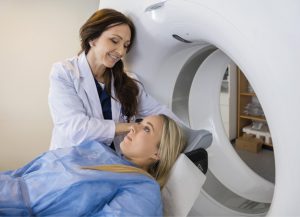By Dr. Arie Dosoretz


Was it discovered early enough? What is the survival rate? Will health insurance cover treatment costs? What happens if the cancer spreads?
Cancer is one of the scariest diagnoses imaginable, but a vast majority of cases can be treated effectively through surgery, chemotherapy, radiation, bone marrow transplants and other therapies. Throughout your cancer journey, a trusted physician and his or her team of medical professionals will become your biggest allies.
Radiation therapy, which uses high-energy beams or radiation to kill or shrink cancer cells, has become a preferred treatment option for oncologists and patients alike. It is proven effective on many types of cancers, including breast, prostate, brain, bone, colon, liver, lung and others.
Before starting radiation treatments, be sure to ask the following questions:
How do you deliver radiation treatments?
Today’s technology delivers far superior treatments compared to the turn of the century, or even a few years ago. The new Halcyon machine at Advocate Radiation Oncology, for example, delivers radiation treatments so precise that healthy tissue just a millimeter away is not damaged. Advocate’s TrueBeam linear accelerator uses image-guided stereotactic radiosurgery and radiotherapy to treat tumors and lesions. A skilled oncologist should provide a complete radiation therapy plan that maps out the entire treatment timeline.
Are treatments painful?
Radiation treatments themselves are relatively painless, but traditionally cancer patients have felt the most discomfort in the days and weeks after treatments. Because of the aforementioned precision of modern-day radiation treatments, side effects aren’t nearly as severe as a generation ago because radiation beams focus only on dangerous cancer cells. And with fewer symptoms, many patients will enjoy an improved quality of life.
How long do treatments take?
The Halcyon machine, which is considered the most advanced radiation therapy system on the market, delivers image-guided radiation therapy up to four times faster than standard technology. This means patients spend less time undergoing treatments and more time at home focusing on their recovery. In fact, treatments often take less time than a routine annual physical. Depending on the treatment plan a radiation oncologist prescribes, treatments could last for as little as three to five days, or up to five days a week for a longer period.
Is it safe to seek treatment now?
Oncologists have always encouraged the practice of social distancing, especially as COVID-19 remains a threat to those with compromised immune systems. Compared to homes, supermarkets and restaurants, medical offices are by far the cleanest, sterile environment, so safety concerns about visiting a doctor’s office should be minimal. Your chances for a full recovery are much better if treated right away.
What is the cost?
Most major insurance companies provide strong coverage for cancer treatments. Like any type of medical treatment, cancer patients should expect to see copays and deductibles. Cancer patients can reach the “out-of-pocket maximum” through their insurance plan, at which time the insurance company covers 100% of costs. An oncologist’s billing department should handle all of the paperwork so patients can focus on their recovery, regardless of their financial situation.
Should I change my diet?
Radiation takes a toll on the human body. The negative health impacts can be minimized by consuming a healthy diet with plenty of water and foods that contain vitamins, minerals, lean protein and carbohydrates. Avoid foods high in sodium, added sugars and saturated fats.
Will exercise aid or impede recovery?
Fatigue is a common side effect of radiation treatments, but moderate exercise can offset the impact. Just 20 to 30 minutes of moderate-
intensity aerobic exercise each day can help improve a patient’s health, psychological outlook and quality of life.
About Advocate Radiation Oncology
Advocate Radiation Oncology is a locally owned practice with five convenient locations in South Florida. The practice’s mission is to provide compassionate health care expertise to cancer patients. Advocate Radiation Oncology is directed by a team of world-class, board-certified radiation oncologists. For more information, please visit AdvocateRO.com.
 Southwest Florida's Health and Wellness Magazine Health and Wellness Articles
Southwest Florida's Health and Wellness Magazine Health and Wellness Articles

